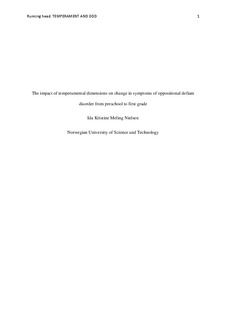| dc.contributor.advisor | Wichstrøm, Lars | nb_NO |
| dc.contributor.author | Nielsen, Ida Kristine Meling | nb_NO |
| dc.date.accessioned | 2014-12-19T14:43:19Z | |
| dc.date.available | 2014-12-19T14:43:19Z | |
| dc.date.created | 2014-07-11 | nb_NO |
| dc.date.issued | 2014 | nb_NO |
| dc.identifier | 733829 | nb_NO |
| dc.identifier.uri | http://hdl.handle.net/11250/271234 | |
| dc.description.abstract | Oppositional defiant disorder (ODD) is often present already at preschool age. Previous research has established the association between temperament and broad categories of behavioral disorders. However, no longitudinal research has studied the potential impact of temperament on changes in ODD symptoms in preschool and early school years. Two birth cohorts of 4-year olds living in the city of Trondheim, Norway, were screened for emotional and behavioral problems and a subsample oversampled for such problems was drawn to take part in the study; 82.1% consented. Parents of 1000 children were interviewed with the Preschool Age Psychiatric Assessment, and ratings of children's temperament were provided using the Child Behavior Questionnaire (CBQ). Children were reassessed after 2 years (N = 797). The temperamental dimensions Surgency (SU) and Negative Affectivity (NA) were positively correlated with initial level of ODD symptoms, and predicted an increase in symptoms from age 4 to 6. High Effortful Control (EC) was associated with little ODD symptoms at age 4, but did not predict change in such symptoms. However, in interaction with NA, EC was associated with lower initial levels of ODD symptoms and predicted a decrease in symptoms from age 4 to 6. More precisely, the protective effect of EC was very strong for children high on NA but lower for children low to moderate on NA. The findings suggest that NA and SU function as risk factors whereas EC protects against ODD in young children. NA serves as a moderator of EC, in that among children high in NA, EC had a large protective effect, whereas among children with lower levels of NA, EC did protect to a lesser degree against ODD symptoms. Results of this study have theoretical implications linking temperament to ODD in preschoolers, and clinical applications utilizing temperament assessment to identify children at risk, prevent development of ODD and match treatment modalities to the child’s specific temperamental strengths and weaknesses. | nb_NO |
| dc.language | eng | nb_NO |
| dc.publisher | Norges teknisk-naturvitenskapelige universitet, Fakultet for samfunnsvitenskap og teknologiledelse, Psykologisk institutt | nb_NO |
| dc.subject | temperament | en_GB |
| dc.subject | oppositional defiant disorder | en_GB |
| dc.subject | preschool | en_GB |
| dc.subject | longitudinal | en_GB |
| dc.title | The impact of temperamental dimensions on change in symptoms of oppositional defiant disorder from preschool to first grade | nb_NO |
| dc.type | Master thesis | nb_NO |
| dc.source.pagenumber | 41 | nb_NO |
| dc.contributor.department | Norges teknisk-naturvitenskapelige universitet, Fakultet for samfunnsvitenskap og teknologiledelse, Psykologisk institutt | nb_NO |
